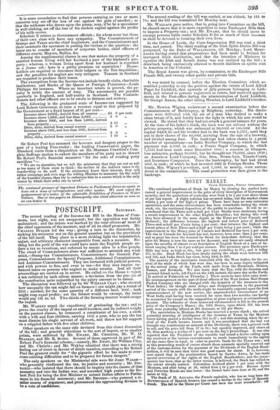POSTSCRIPT. SATURDAY.
The second reading of the Income-tax Bill in the House of Com- mons, last night, was not unopposed; but the opposition was feebly maintained ; and the debate was marked by the total silence of most of the chief opponents of the measure, and of all its chief promoters. Mr. CHARLES BULLER led the way ; giving a turn to the discussion, by making his strictures not on the general question but on the provisions of the bill itself. They place in a more striking light the inquisitorial, unjust, and arbitrary character inseparable from such a measure. No- thing but the peril of the war could have made the English people en- dure a tax so vexations, and enforced by means alien to a free people. The cloud of Commissioners alone was sufficient to astonish any weak mind,—Stamp-tax Commissioners, Commissioners for General Pur- poses, Commissioners for Special Purposes, Additional Commissioners, and Assistant-Commissioners. They are intrusted with judicial powers, and with powers to fine, and even to tax—for they may impose en- hanced taxes on persons who neglect to make returns. And all their proceedings are carried on in secret. He called on the House to reject a tax enforced by such odious means; a deviation from the prat:Lice of the constitution quite unjustified by the paltry amount to be raised. The discussion was followed up by Sir WI:mem CLAY who showed how unequally the tax might fall on farmers! one might pay a rental of 225!.; another, for the same quantity of a different land, 9001.: both might reap equal profits ; yet the former would be exempt, the latter would pay 131. 2s. 6d. Two-thirds of the farming interest would escape the impost.
Mr. WARLEY urged the expediency of graduating the tax ; and to prove the cruelty of the impost on small incomes, and its indirect weight on the poorest classes, he instanced a constituent of his own, a clerk with a wife and four children, earning 160/. a year, who to pay the tax must dismiss his single servant of all-work, and throw her for support on a crippled father with five other children.
Other speakers on the same side deviated from this closer discussion of the bill ; and general objections to the sort of impost, or to smaller points, were enforced by Mr. EWART, Mr. Canurrm, Mr. W. 0. STANLEY, and Mr. R. Score. Several of these approved in part of Sir Robert Peel's financial scheme,—namely, Mr. Ewart, Sir William Clay, and Mr. Christie ; and Mr. Wakley admitted that there was a strong feeling out of doors in favour of direct taxation, conceding to Sir Robert Peel the greatest credit for "the gigantic effort he has made to over- come existing difficulties and to be prepared for future dangers."
The only speakers on the Ministerial side were Sir Joan. WALsw- who generally vindicated the tax, its justice and necessity ; Mr. Dm- EARts—who insisted that there should be inquiry into the causes of that necessity and into the Indian war, and accorded high praise to Sir Ro- bert Peel for being the first Minister to submit Indian affairs to Parlia- ment in his financial statement ; and Mr. Sin-THE—who pursued a si- milar course of argument, and pronounced the approaching division to be a vote of confidence.
The second reading of the bill was carried, at ten o'clock, by 155 to 76; and the bill was committed for Monday next.
Mr. WALLACE gave notice, that in going into Committee on the bill, he should move that it is more expedient to issue Exchequer Bills than to impose a Property-tax ; and Mr. EWART, that he should move to exempt persons liable under Schedule D for so much of their incomes as shall be devoted to insuring their own lives.
In the House of Lords, the Corn-Importation Bill was read a third time, and passed. The third reading of the Irish Spirit-Duties Bill was postponed, by the Duke of WELLINGTON, till Monday ; Lord Miner- EAGLE having stated that preparations had been made in Ireland for increased illicit distillation, and that the intention of Ministers to equalize the Irish and Scotch duties was not realized by the bill ; a drawback being exclusively allowed to Scotch distillers on spirits sent to America or the Colonies.
The Royal Assent was given, by commission, to the Exchequer Bills Frauds Bill, and twenty other public and private bills.


























 Previous page
Previous page